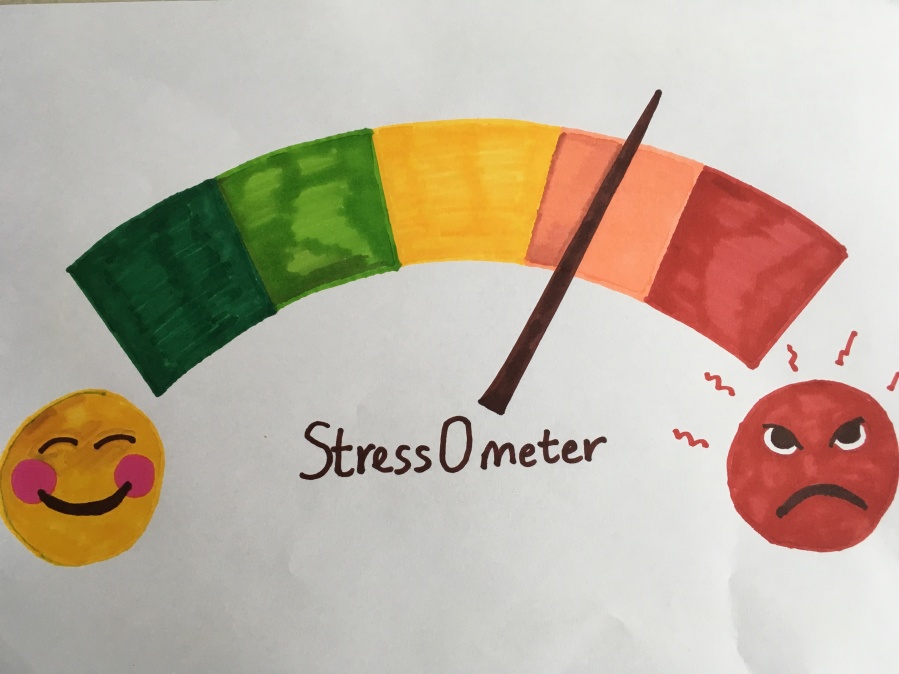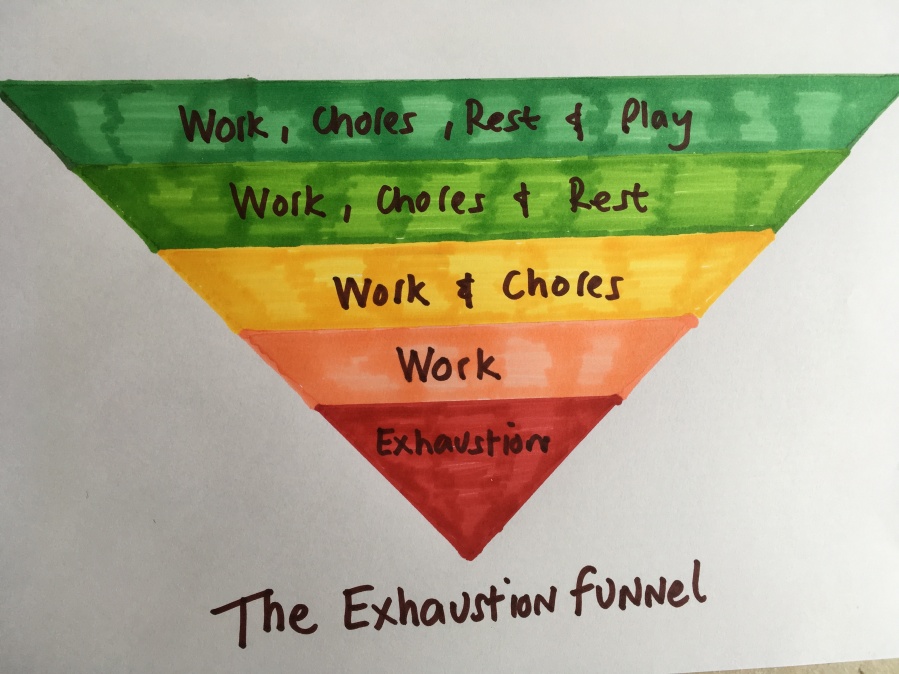Ever had that feeling that you have too many things to do, all of them important, that you don’t quite know where to start? That feeling that if someone asks you to do one more thing, you are not sure that you will respond in a “constructive” way. You feel keyed up, your chest tight and heavy.
I felt like this recently one Saturday morning; that sense of approaching Red on the dial of my StressOmeter. I’m in “High Amber Alert.” I need to get myself back to green.
I take a deep breath, focussing on my breathing. I do this a few times, in for four and out for eight, and feel calmer.

The StressOmeter is a new and wonderful discovery for me. Visualising stress like this makes it feel more manageable. It takes it out from inside me and into a problem that I can solve more objectively.
I use it to draw a mind map of all my stressors, the things that are sending me into the red zone, both at home and work. Seeing it all out on paper somehow makes it seem less overwhelming. And no wonder the dial is up. Like most of us, I am juggling a lot. I realise that I need to prioritise: not everything needs to be done now. And what I do take on doesn’t have to be perfect (another topic!). There are a few things that I can put on hold and I can certainly share a few more tasks at home.
I draw another mind map of the activities that keep me balanced, in the green zone. There are many – but am I actually doing any of them regularly? Prioritising some of these, integrating them into everyday life so that they become unconscious micro-habits, is what I need to focus on.
The Exhaustion Funnel
When we are busy, or things are getting on top of us, the first things to go are the activities that seem optional; the activities we enjoy; the very things that energise us, keep us buoyant and thriving.

If the stress continues, our circle narrows further: we rest less, and we sleep less. We drop the chores at home, and so we are then left with work. However fulfilling our work may be, this alone is unlikely to nourish us, particularly in the current climate or if we are in an uncaring, unsupportive environment. So we are left joyless and exhausted, at risk of burnout or worse.
So, how do we keep buoyant on top of this funnel and prevent getting sucked down?
1. Recognise & minimise stressors
Some stress is good for us. We often perform better under short-term stress. But too much for too long is not healthy, both for our physical and emotional health, as well as for those around us.
Much in our personal and work lives is not changeable, so it is not worth wasting our energy on these. This is clearly easier said than done, but once we do reach some sort of acceptance with these, instead of clinging to them or fighting them or being consumed with anger, regret and other negative emotions, we waste less energy.
It is far better that we focus on the areas that might make a difference. This might be leaving a toxic work environment or an unhealthy relationship, or something smaller, such as looking at what you can do as a team or at home to make life easier all round.
2. Invest in the activities that allow you to re-charge and have fun.
What makes you laugh? What makes you happy and feel good? Have fun with this. It is important to be honest with yourself.
There are many things that we do that we know ought to make us feel happy, but in reality, don’t or can actually leave us feeling worse. For example, dashing off on a Friday night for a weekend away to ‘recharge’. The reality often being that we put ourselves under more pressure to get away from work on time, with a tiring and stressful journey there and back.
Athletes and coaches have long recognised the importance of rest and recovery after intense training. This oscillation between stress and recovery is key to better performance.
This is the same for us all. We need to truly invest and value the activities that keep us buoyant. We need to be honest about what really does keep us in the green zone and what doesn’t. And to do what is in our power to reduce our stress so that it is not too much.
What can we do once we notice the dial is up?
Dr Rick Hanson observes that
“The body can switch from Green to Red in a heartbeat. Then it takes a while to return to Green since stress hormones need time to metabolize out of your system. Even in Yellow and Orange, the effects and thus the costs of stress activation are present. So as soon as you notice the needle of your stress-o-meter moving into Yellow and beyond, take action.”
Taking action is not about doing. It is the opposite – it is slowing down and taking a step back and grounding yourself. This might be going outside, getting some fresh air and moving; it might be listening to music, or taking a few deep breaths, with the inhale twice as long as the exhale or 4,7,8 breathing – whatever works for you.
So what changes have I made?
To keep in the green: committing to 10 minutes meditation a day and 30 minutes of purposeful activity a day. The activity in one go – a 30 minute run or a cycle on the exercise bike (whilst watching a box set with dinner in the oven) – but more often than not in bite size chucks that feel far less daunting and are much more manageable – a 10 minute brisk walk home from school drop-off on the days that I do it, a 10 minute brisk walk to clear my head when at work and 10 minutes of squats and steps whilst watching the news.
To stay out of the red: to allow 20% contingency so there is space to comfortably absorb that one more thing.
And so starting with this, if I manage to hit my green goal 80% of the time, then I have done well.
What changes could you make?


Really great blog. I love the visual scale which is simple but helps. I know I was living on amber to red a lot of the time but with some effort there’s more green creeping in. Thanks.
LikeLike
Thanks Juliet!
LikeLiked by 1 person
Thank you, so need to hear this sometimes and remember to look after myself so I can look after others. Beautifully written and practical
LikeLike
Thank you Sam!
LikeLike
Hi Kate, I’m finding the funnel metaphor a helpful way to remember that there is a cost to being too busy…I may not suffer it immediately, but sooner or later, it will suck me down! And, yes, I agree, the things I want to do, like play and rest are the first to go as life gets busier. Thanks for the article.
LikeLike
Thanks Jim
LikeLike